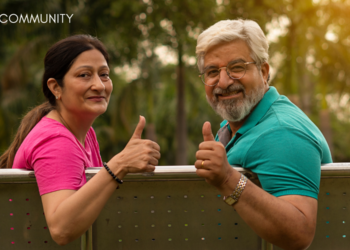Globally, breast cancer is the most common form of cancer, and in India, it is now topping the list of cancer occurrences. Thankfully, studies show survival rates are encouraging – For 5-year overall survival, it is 95% for stage I patients, 92% for stage II, 70% for stage III and only 21% for stage IV patients. While the survival rates for stage IV are more worrying, early detection is the key for all stages. According to reports, this aspect is the biggest blocker in India.
Here, the survival rates are less than in Western countries because detection is late. This aspect is where awareness initiatives like Pinktober can play a significant role. The month of October is observed globally as a breast cancer awareness month, urging people to know the risks and get screened. Just for the record, even men can get breast cancer.

Join Now >
Should I be worried?
As a senior woman, should I be worried about breast cancer and undergo screening? Let’s understand the modalities at play to see if it can help answer your question.
If you are above 55, you tick one of the boxes for risk factors- age. A family history of breast cancer increases your breast cancer risk. Genetics plays an important part role. If you have inherited genetic mutations like BRCA1 and BRCA2 genes, then that is another risk factor box ticked. Obesity, smoking, drinking, radiation exposure and hormone replacement therapies are other risk factors you must consider.
Depending on your situation, if you have more than a few risk factors, it is always advisable to get a yearly screening done. There is no cause to worry, as, with early diagnosis, it is fully curable, with a healthy survival rate.
All breast cancers are not the same.
There are different types and subtypes of breast cancer. Also, they fall into various stages when the diagnosis is done. Doctors usually use mammography, breast ultrasound, MRI, biopsy, etc., to identify the presence and the disease progress to arrive at treatment modes. Hence, treatments are customised to suit the patients. They differ from patient to patient. Common treatment options are lumpectomy, mastectomy, chemotherapy, radiation therapy, immunotherapy, hormone therapy, etc. Also, breast reconstruction surgeries are an option for women who undergo mastectomy.
Breast cancer diagnosis and treatment can be highly distressing and induce fear. But these days, people have better survival chances because of advanced treatment options with fewer side effects. Also, most hospitals offer counselling services to help patients cope.
Is there any way I can prevent breast cancer?
It would have been good if we could have some way to prevent breast cancer. But sadly, it is not there. So, what you can do best is to understand the risk factors and ensure you control those factors which you can.
What can I do?
Here are some steps you can take to reduce your breast cancer risk.
Maintain a healthy weight.
Since obesity is a risk factor, it is essential to maintain a healthy body weight. Two things that can help in this are a healthy diet and regular exercise.
Follow a healthy diet.
Diet can play a significant part in helping you to maintain your body weight and health. To reduce breast cancer risk, you must include lots of fresh fruits and vegetables in your diet. It also helps if you consume Calcium-rich dairy products and lean protein. Avoid red meat or processed meat.
Exercise regularly
Try to exercise for at least 30 minutes per day. You could walk, jog, cycle, or do physical work around the house. Being physically active helps reduce the risk of developing many diseases, not just breast cancer.
Quit smoking and drinking.
Giving up entirely smoking and drinking can reduce your chances of breast cancer.
Avoid hormone therapy for menopause treatment.
Women over 50 may undergo treatment for menopausal issues. At times, it could include hormone therapy. However, it helps to discuss this matter with the doctor to understand your risks and avoid taking it for long. Some of the breast cancer types are categorised as oestrogen and progesterone receptors. Therefore, these hormones increase the risk of breast cancer.
Regular screening
Discuss your medical and family history with your doctor. If you are in the high-risk category, explore options for reducing risk factors. For example, some people are advised to consume prescription drugs like tamoxifen, while there are a few women who undergo preventive mastectomy also.
But the best way to stay ahead in the fight against breast cancer is to observe your breasts for any change in colour, lumps, rashes, etc., and visit a doctor in case of any doubts. Self-examination of breasts to know any possible issues is essential. A yearly mammogram in consultation with the doctor can help detect early disease onset.
Breast cancer is curable. But it’s better to try and avoid it to the extent possible. Stay informed and follow these tips to reduce risk factors and stay healthy.









